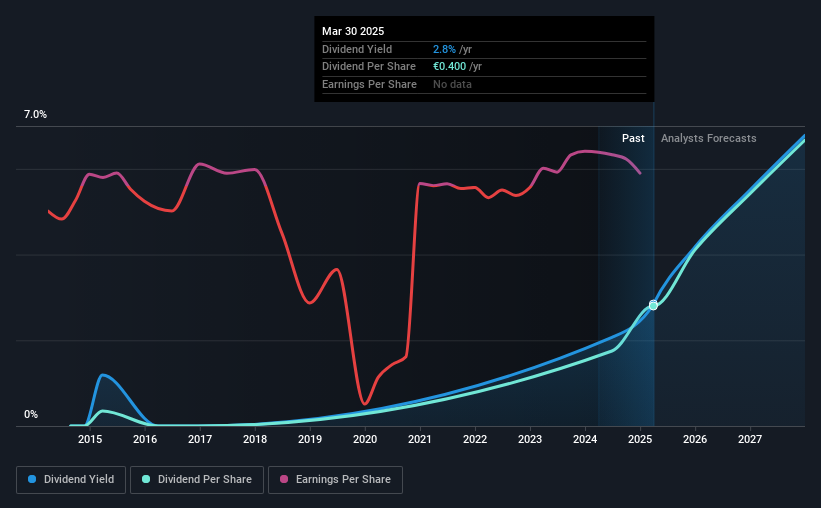- Greece
- /
- Electric Utilities
- /
- ATSE:PPC
Public Power (ATH:PPC) Will Pay A Larger Dividend Than Last Year At €0.40
Public Power Corporation S.A. (ATH:PPC) has announced that it will be increasing its dividend from last year's comparable payment on the 25th of July to €0.40. Although the dividend is now higher, the yield is only 2.8%, which is below the industry average.
Public Power's Projected Earnings Seem Likely To Cover Future Distributions
It would be nice for the yield to be higher, but we should also check if higher levels of dividend payment would be sustainable. Before making this announcement, Public Power was paying out a fairly large proportion of earnings, and it wasn't generating positive free cash flows either. Generally, we think that this would be a risky long term practice.
According to analysts, EPS should be several times higher next year. If the dividend continues along recent trends, we estimate the payout ratio will be 30%, which would make us comfortable with the dividend's sustainability, despite the levels currently being elevated.

See our latest analysis for Public Power
Dividend Volatility
While the company has been paying a dividend for a long time, it has cut the dividend at least once in the last 10 years. Since 2015, the dividend has gone from €0.05 total annually to €0.40. This implies that the company grew its distributions at a yearly rate of about 23% over that duration. Despite the rapid growth in the dividend over the past number of years, we have seen the payments go down the past as well, so that makes us cautious.
Dividend Growth Could Be Constrained
With a relatively unstable dividend, it's even more important to see if earnings per share is growing. It's encouraging to see that Public Power has been growing its earnings per share at 86% a year over the past five years. Earnings per share is growing nicely, but the company is paying out most of its earnings as dividends. This might be sustainable, but we wonder why Public Power is not retaining those earnings to reinvest in growth.
The Dividend Could Prove To Be Unreliable
Overall, this is probably not a great income stock, even though the dividend is being raised at the moment. Strong earnings growth means Public Power has the potential to be a good dividend stock in the future, despite the current payments being at elevated levels. This company is not in the top tier of income providing stocks.
It's important to note that companies having a consistent dividend policy will generate greater investor confidence than those having an erratic one. Meanwhile, despite the importance of dividend payments, they are not the only factors our readers should know when assessing a company. For example, we've identified 4 warning signs for Public Power (2 make us uncomfortable!) that you should be aware of before investing. Looking for more high-yielding dividend ideas? Try our collection of strong dividend payers.
New: Manage All Your Stock Portfolios in One Place
We've created the ultimate portfolio companion for stock investors, and it's free.
• Connect an unlimited number of Portfolios and see your total in one currency
• Be alerted to new Warning Signs or Risks via email or mobile
• Track the Fair Value of your stocks
Have feedback on this article? Concerned about the content? Get in touch with us directly. Alternatively, email editorial-team (at) simplywallst.com.
This article by Simply Wall St is general in nature. We provide commentary based on historical data and analyst forecasts only using an unbiased methodology and our articles are not intended to be financial advice. It does not constitute a recommendation to buy or sell any stock, and does not take account of your objectives, or your financial situation. We aim to bring you long-term focused analysis driven by fundamental data. Note that our analysis may not factor in the latest price-sensitive company announcements or qualitative material. Simply Wall St has no position in any stocks mentioned.
About ATSE:PPC
Public Power
Generates, transmits, and distributes electricity in Greece, Romania, Bulgaria, and North Macedonia.
Moderate growth potential with acceptable track record.
Similar Companies
Market Insights
Weekly Picks


Crazy Undervalued 42 Baggers Silver Play (Active & Running Mine)


Fiducian: Compliance Clouds or Value Opportunity?

Willamette Valley Vineyards (WVVI): Not-So-Great Value
Recently Updated Narratives

Watch Pulse Seismic Outperform with 13.6% Revenue Growth in the Coming Years

Significantly undervalued gold explorer in Timmins, finally getting traction

Moderation and Stabilisation: HOLD: Fair Price based on a 4-year Cycle is $12.08
Popular Narratives


MicroVision will explode future revenue by 380.37% with a vision towards success


NVDA: Expanding AI Demand Will Drive Major Data Center Investments Through 2026





